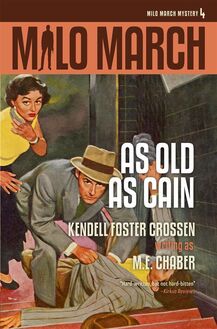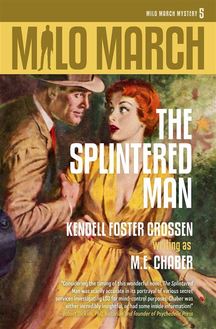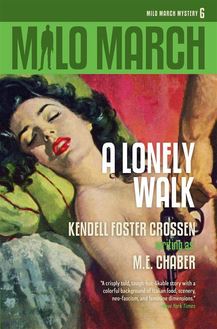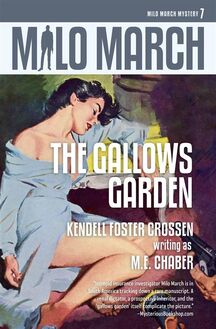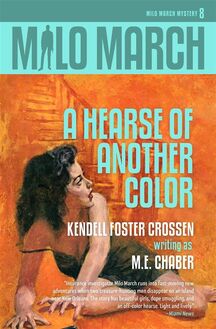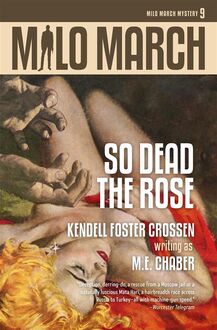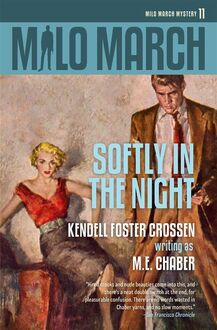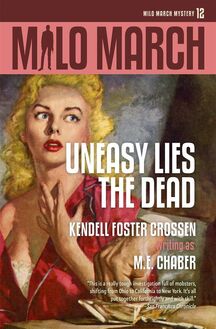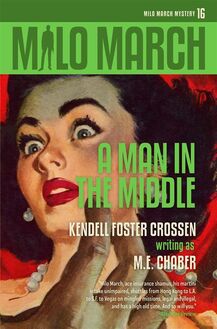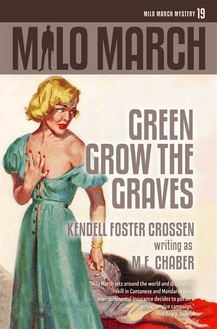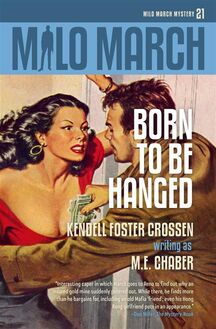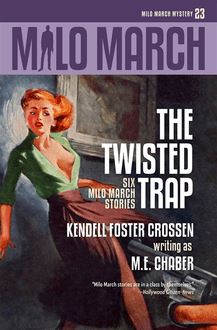-
 Univers
Univers
-
 Ebooks
Ebooks
-
 Livres audio
Livres audio
-
 Presse
Presse
-
 Podcasts
Podcasts
-
 BD
BD
-
 Documents
Documents
-
- Cours
- Révisions
- Ressources pédagogiques
- Sciences de l’éducation
- Manuels scolaires
- Langues
- Travaux de classe
- Annales de BEP
- Etudes supérieures
- Maternelle et primaire
- Fiches de lecture
- Orientation scolaire
- Méthodologie
- Corrigés de devoir
- Annales d’examens et concours
- Annales du bac
- Annales du brevet
- Rapports de stage
La lecture à portée de main
Vous pourrez modifier la taille du texte de cet ouvrage
Découvre YouScribe en t'inscrivant gratuitement
Je m'inscrisDécouvre YouScribe en t'inscrivant gratuitement
Je m'inscrisEn savoir plus
Vous pourrez modifier la taille du texte de cet ouvrage
En savoir plus

Description
- “The Jelly Roll Heist.” A series of thefts in Denver has the insurance executives biting their nails. Judging by the loss of a belly dancer’s navel gem, it looks like a seducer is preying on ladies with sparkly things. Or is there a more sinister gang behind it?
- “Hair the Color of Blood.” Milo’s on vacation at a swank Santa Monica hotel when he hears a scream. He rushes to save the damsel in distress, and the next thing he knows, he’s waking up in bed with the naked body of a red-haired corpse!
- “The Hot Ice Blues.” A new jewel robbery occurs every night, while Milo sits around playing Dixieland platters with a real gone chick. Is the insurance company’s star investigator really goofing off?
- “Murder for Madame.” Someone swipes a worthless box, tossing aside the costly pearl necklace that was inside. Now four people are desperate to retrieve the box―five if you count Milo, who can’t resist trying to figure out why.
- “The Red, Red Flowers.” Major March, U.S. Army Reserve, is sent undercover to Moscow, where a captured American U-2 pilot is on trial. As usual, Milo has no plan but makes it up as he goes along. He will have mere moments to retrieve a coded message and snatch the pilot from the Communists’ hands—but things don’t go exactly as expected.
- “The Twisted Trap.” Just because you’re paranoid doesn’t mean they’re not out to get you. A wealthy old policyholder claims that his sexy young wife and her psychiatrist lover have teamed up to poison him with a drug that mimics the symptoms of madness. If he should die “accidentally” as a result of this condition, his wife will get an enormous life insurance payout. Having escaped from a sanatorium, the old man insists that Milo must rescue him. But doing so may cost Milo his own sanity!
Sujets
Informations
| Publié par | Steeger Books |
| Date de parution | 10 mai 2021 |
| Nombre de lectures | 0 |
| EAN13 | 9791220802451 |
| Langue | English |
Informations légales : prix de location à la page 0,0000€. Cette information est donnée uniquement à titre indicatif conformément à la législation en vigueur.
Extrait
The Twisted Trap: Six Milo March Stories
by
Kendell Foster Crossen
Writing as M.E. Chaber
With a Foreword by Kendra Crossen Burroughs
Steeger Books / 2021
Copyright Information
Published by Steeger Books
Visit steegerbooks.com for more books like this.
©2021 by Kendra Crossen Burroughs
First Edition
The unabridged stories have been lightly edited by Kendra Crossen Burroughs.
All rights reserved. No part of this book may be reproduced or utilized in any form or by any means, electronic or mechanical, without permission in writing from the publisher. The scanning, uploading, and distribution of this book via the Internet or via any other means without the permission of the publisher is illegal and punishable by law.
Foreword
The Milo March Stories
Kendell Foster Crossen published more than sixty pieces of short fiction before deciding to write his first full-length novel. For that purpose he invented a new hero, named Milo March, a tough guy with a quick wit. “I wear a trench coat when it’s raining. I carry a gun when somebody is trying to shoot me. I chase women, but only when they get that chase-me-look in their eyes.” He has a seemingly unlimited capacity for booze. “Many people complain that I drink a lot. I do, but I also do the things that have to be done.” There are two things that have to be done: “To solve the case I’m on and to stay alive.”
Ken Crossen told an interviewer for a fanzine: “I worked out the character of Milo March, making him an insurance investigator since that was something I knew very well. I was to some degree influenced by Hemingway and Hammett, but added more of a dash of humor and more throwaway lines. Partly as a result of this, a later reviewer said that I wrote ‘soft-boiled’ novels.” Milo March can be hard-boiled, yet he can also be gentle and compassionate. I fantasize that a lesson could be learned today from Milo’s preference for shooting people without killing them. Could that be a holdover from Ken Crossen’s pulp hero The Green Lama, a Buddhist who never carried a gun and would not kill, preferring more esoteric ways of disabling villains?
Milo made his debut in Hangman’s Harvest, published in hardcover in February 1952. From there his exploits evolved into twenty more books, published between 1952 and 1973 under the pen name M.E. Chaber. The series acquired a following in the U.S. and abroad, but what really put Milo on the map was the mass-market series released by Paperback Library in 1970–1971, with the stylish, sexy cover art of Robert E. McGinnis.
Milo also appeared in nine pieces of short fiction published in magazines between 1952 and 1961. Three of them were condensed versions of full-length treatments: “Assignment: Red Berlin” is a shorter version of the novel No Grave for March; “The Man Inside” was expanded to become the novel of the same name; and “The Bodies Beautiful of Rome” is a condensed version of A Lonely Walk. Those three novels are in the present series, so the condensed versions are not included. That leaves the six short stories that are brought together in this volume.
Although the character was intended to be an insurance investigator, Milo was also in the Army during World War II and is still an officer in the Reserves. So in some of the books Major March is recalled to carry out dangerous missions for the CIA.
Oddly, Milo performs neither of these roles in the first book. In Hangman’s Harvest he’s just a plain private eye, on loan from a Denver insurance firm to clean up a vice-ridden California town. The next book in the series is a spy novel, No Grave for March, in which our hero is sent to East Germany. So Milo doesn’t actually tackle an insurance case until the first short story. “The Jelly Roll Heist” (1952) and two other stories (1953) are centered on jewel robberies, each with its own twists and surprises.
Another oddity is that even though Milo is a resident of Denver (until he moves to New York City in 1956), none of the first five novels is set there, since Milo is always traveling to other cities and countries. So only in three of the short stories does the action take place in the Mile High City.
By 1961, the publication date of the last two stories, Milo has set up his own insurance detective agency in New York City, with an office on Madison Avenue. But almost as soon as the story “The Red, Red Flowers” begins, he is summoned from the martini capital, is flown over Soviet Russia, and parachutes in, just outside Moscow. A few of the elements in “The Red, Red Flowers” are also present in two novels set in Russia— So Dead the Rose (1959) and Wild Nights in Moscow (1968). It’s not uncommon for a writer to recycle material or rework details from one story to another. What does strike me (though I don’t want to give anything away) is that in “The Red, Red Flowers” Crossen seems to have seized the opportunity to create a happier outcome, as if he wanted to go back and set things right.
The title story, “The Twisted Trap,” revisits, in a different context, the horrible predicament central to the plot of The Splintered Man (1955), in which a man is being dosed, without his knowledge, with a drug that causes schizophrenia-like symptoms such as hallucinations and distorted thinking—LSD. Crossen also explored LSD in a young adult novel, The Acid Nightmare (1967), in which a teenager experiences a good trip and then a bad trip. It’s interesting that Crossen was fascinated by LSD, yet he himself had never taken it, relying on research to write the accounts of trips. I showed the passages from The Splintered Man to a professional expert, who confirmed that the descriptions of LSD experiences are credible.
Over the course of a prolific career, Ken Crossen created many detective characters, including a book reviewer, a playwright, a crime reporter, a few police detectives, a mortician, and a Buddhist monk—in addition to insurance investigators, and even an intergalactic investigator in the humorous Manning Draco science fiction stories. The insurance investigator was a natural choice, since Ken himself had worked in that business as a young man in Ohio. But Milo March was special, becoming the author’s favorite of all the sleuths whose stories he published under five pseudonyms. So strong was the identification with that personality that Crossen would tell a columnist in the Los Angeles Times: “Milo March is simply myself.”
Kendra Crossen Burroughs
Milo March Short Fiction by M.E. Chaber
“The Jelly Roll Heist.” Popular Detective, September 1952 (vol. 43, no. 2).
“Assignment: Red Berlin.” Bluebook, December 1952 (vol. 96, no. 2).
“Hair the Color of Blood.” Bluebook, July 1953 (vol. 97, no. 3).
“The Hot Ice Blues.” Bluebook, September 1953 (vol. 97, no. 5).
“Murder for Madame.” Popular Detective, Fall 1953 (vol. 45, no 1).
“The Man Inside.” Bluebook, December 1953 (vol. 98, no. 2).
“The Bodies Beautiful of Rome.” Cavalier, July 1957 (vol. 5, no. 49).
“The Red, Red Flowers.” Bluebook, February 1961 (vol. 100, no. 3).
“The Twisted Trap.” Bluebook, June 1961 (vol. 100, no. 5).
The Jelly Roll Heist
The Inter-World Insurance Service Corporation is in the Gilmore Building in Denver. Tenth floor. Three private offices and a reception room. At the outside desk there is a receptionist. Peaches-and-cream skin and blue-black hair; built-in accessories that have made many a man forget why he came up the ten stories. The door behind her has frosted glass and small black letters that say Milo March. That’s all. Nothing to indicate that I was on the other side of the door and that I’d been there since nine in the morning, wading through reports, mostly my own, until I had diamonds in my eyes.
It was almost time to quit for the day when my phone rang. It was the peaches-and-cream skin and the blue-black hair. “You still sober, Milo?” she wanted to know.
After thinking it over, I decided to be insulted. On my desk there were two ounces of brandy that I’d been nursing since four o’clock, and there was still one sip left.
“Take your trade elsewhere, girl,” I said with dignity. “I’m too busy to see you tonight.” Which was a laugh. Our receptionist was a strictly-for-keeps girl. I knew. I’d tried enough times.
She laughed. “He wants to see you,” she said. “Now.”
I hung up and finished the brandy. “He” was Niels Bancroft, the owner and president of Inter-World. A nice guy. He never bothered me when I was working on a job, and he knew that for two weeks I’d been digging in. Somebody was working my side of the street. In six months, there had been almost a million dollars’ worth of jewelry lifted in Denver or near it. All of it from women. The individual jobs had run from $10,000, the smallest, to $150,000 in diamonds. The insurance companies were screaming, and the whole thing was my baby. So if Niels wanted to see me, it meant that there was a new case to add to the others or that the insurance companies were getting hotter.
I walked out of my office and turned to the middle door. It was solid oak, as simple looking as a thousand-dollar bill, with Niels’s name on it in the kind of letters that made it unnecessary to read further to know that it also said President and Private. I opened the door and stepped inside.
Niels Bancroft is a big man who looks like an ex-pug. His hair is gray and there are little gray tufts sticking out of his ears. He’s a chain smoker and sticks half a cigarette in his mouth. He wears $200 suits and a $500 watch, but he still lights my cigarettes with big kitchen matches. He looked up as I came in and motioned me to a chair.
“How’s it going, Milo?” he asked.
“You just asking or you want to know?” I said. “If i
-
 Univers
Univers
-
 Ebooks
Ebooks
-
 Livres audio
Livres audio
-
 Presse
Presse
-
 Podcasts
Podcasts
-
 BD
BD
-
 Documents
Documents
-
Jeunesse
-
Littérature
-
Ressources professionnelles
-
Santé et bien-être
-
Savoirs
-
Education
-
Loisirs et hobbies
-
Art, musique et cinéma
-
Actualité et débat de société
-
Jeunesse
-
Littérature
-
Ressources professionnelles
-
Santé et bien-être
-
Savoirs
-
Education
-
Loisirs et hobbies
-
Art, musique et cinéma
-
Actualité et débat de société
-
Actualités
-
Lifestyle
-
Presse jeunesse
-
Presse professionnelle
-
Pratique
-
Presse sportive
-
Presse internationale
-
Culture & Médias
-
Action et Aventures
-
Science-fiction et Fantasy
-
Société
-
Jeunesse
-
Littérature
-
Ressources professionnelles
-
Santé et bien-être
-
Savoirs
-
Education
-
Loisirs et hobbies
-
Art, musique et cinéma
-
Actualité et débat de société
- Cours
- Révisions
- Ressources pédagogiques
- Sciences de l’éducation
- Manuels scolaires
- Langues
- Travaux de classe
- Annales de BEP
- Etudes supérieures
- Maternelle et primaire
- Fiches de lecture
- Orientation scolaire
- Méthodologie
- Corrigés de devoir
- Annales d’examens et concours
- Annales du bac
- Annales du brevet
- Rapports de stage
